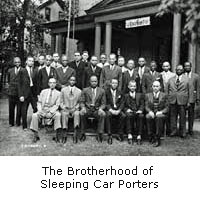Rail, Water and Passengers

 The
railroad linked the land and water at Oakland with both freight and
passengers. Freight traveled in freight cars but many passengers
traveled in luxury: the railroad's Pullman Sleeping Cars, attended by
the Pullman Porters. The Porters were African Americans whose job
required that they provide calm, courteous service no matter how
unreasonable a passenger might become. The work was hard, and hours
could exceed 400 a month. The wages were 50 cents a day in 1872 and
increased only slowly thereafter. But it was steady work, and the
Porters were held in high regard in the community. They traveled widely
and were an important source of news about job opportunities for African
Americans around the country.
The
railroad linked the land and water at Oakland with both freight and
passengers. Freight traveled in freight cars but many passengers
traveled in luxury: the railroad's Pullman Sleeping Cars, attended by
the Pullman Porters. The Porters were African Americans whose job
required that they provide calm, courteous service no matter how
unreasonable a passenger might become. The work was hard, and hours
could exceed 400 a month. The wages were 50 cents a day in 1872 and
increased only slowly thereafter. But it was steady work, and the
Porters were held in high regard in the community. They traveled widely
and were an important source of news about job opportunities for African
Americans around the country.
In 1925, the Porters formed a union to fight for better wages and more
reasonable working hours. The Brotherhood of Sleeping Car Porters was in
the vanguard of the struggle for equality and civil rights across the
nation. C. L. Dellums was among its leaders. Oakland's train station is
named in his honor.
Deborah Cooper
Oakland Museum of California
 "Walk Along the Water"
"Walk Along the Water"
© Oakland Museum of California, used with permission.

 back to history map
back to history map